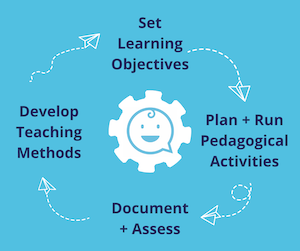Early childhood education is a lot about planning, but the truth is that without assessing the plans, children's learning, and educators' teaching methods - everything just stays still and there is no development and no clear path where to go.
.png)
All workplaces assess and measure their success, and explore how to do things better. In all businesses, it is key to:
- Set clear objectives
- Do the work
- Measure the results
- Create a feedback loop for developing the way of working
In the world of early childhood education, all this feels a bit strange and distant, but actually, when you think of it, it makes perfect sense. In the preschool world, the same thing "Assessment wheel" means:
- Set clear learning objectives
- Plan and run playful pedagogical activities
- See the results and make assessments
- Develop teaching methods in a consistent way throughout the term
After you have done all steps 1 + 2 + 3 + 4, you can start all over again. The assessment wheel will help you with many occasions year-round!
Assessment methods in early education
Assessment practices are evolving away from the examination of physical products of learning, such as worksheets and standardized assessments toward examining the process of learning. Sometimes concrete paper worksheets can still be practical and relevant, but their importance is descending.
In early childhood education learning happens mostly through play. Play is a continuum of activities including child-initiated free play, play with adult guidance, and teacher-directed play. Play often does not produce concrete documents to be assessed by educators.
But how to assess play? How to assess children's learning?
This is based on collecting pedagogical documentation of children’s individual growth and how learning unfolds within different classroom activities. Observations are done during the learning moments to provide an authentic understanding of children’s learning progress.
→ For example; if a child is making a puzzle, a teacher can take a photo of the child's learning moment in order to remember that the child succeeded and completed a puzzle of 24 jigsaw pieces in January! The photo can be shared with the child's family and put in his portfolio/learning folder.
Later on, the observations are reflected with the children, peers, and parents during the term. Everyone can see how the child succeded with the puzzle of 24 pieces in January, what will he be able to do in June? Linking observations to the learning objectives creates a continuous feedback loop to improve children’s learning and the quality of the center.
Learning assessment is continuous work, educators must observe children's play and learning moments regularly in order to see the change, growth, and steps in development.
If it seems like children do not learn new skills, achieve their learning goals, or gain knowledge that is suitable for their age, it is a good idea to rethink the educator's teaching methods and modify them to better suit the children's needs. (Often for example playing and doing activities in small groups is more beneficial for children's learning than being in a big group of 20 children.)
Technology strongly supports the assessment process
Every educator has their own preferred methods on how to observe learning moments, how to practically document the observations, and how to store them. Nevertheless, nowadays technological tools give much-needed help with these processes!
Technology can be used to store and share different types of assessment data to promote child, co-teacher, and parent reflection as well as guide and direct the next teaching steps. New technological tools can be used efficiently and quickly to save time and reduce office hours.
The technological tools also automatically collect a lot of information into reports and statistics, that can be used in a completely new way to develop the quality of the center.

Based on the best Finnish practices, Kindiedays has developed a complete Pedagogical Management Solution as the foundation for a modern preschool. The playful learning process, new formative assessment, and use of Kindiedays for portfolio learning and pedagogical documentation are outlined on our web page.
If you would like to explore how Kindiedays can help to meet your specific needs, why not book a consultative call with our expert?
We look forward to assisting you in creating an exceptional learning environment for young minds.
Happy learning (and assessing)!
.png)
.png)